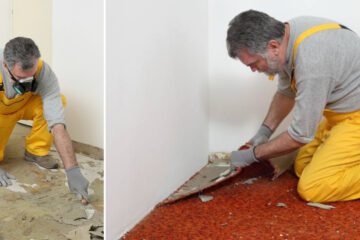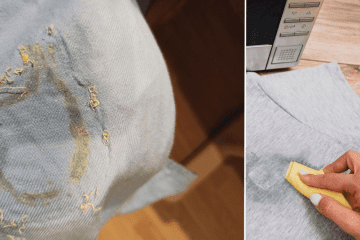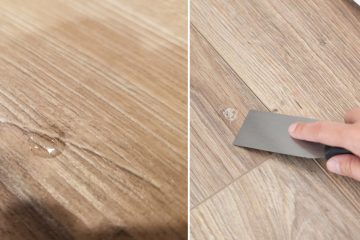Denture glue, also known as denture adhesive, can save the day when your dentures don’t quite stay in place. But let’s be real—it’s a temporary fix. If you’re tired of dealing with sticky paste, cleaning up residue, or worrying about the health risks of prolonged adhesive use, you’ve likely wondered if there are better ways to keep your dentures in place.

You’re not alone. Plenty of people look for alternatives to denture glue that are easier, healthier, and longer-lasting. So, if you’re done with the hassle of glue, here’s what you can try instead.
Key Takeways:
- Denture glue isn’t a long-term solution and can cause zinc toxicity
- Six main alternatives: powders, adhesive pads, cushioning liners, temporary relines, muscle training, and implant-retained dentures
- Never use household glues or DIY solutions on dentures
- Well-fitting dentures shouldn’t require adhesives – regular dental visits are essential
Why You Shouldn’t Rely on Denture Glue Forever
Health Concerns
Denture adhesive might seem like a handy solution, but it has its issues. Many adhesives contain zinc, which, if overused, can cause zinc toxicity. Too much zinc in your system can lead to nerve damage and other health problems. Not exactly what you want from something that’s supposed to help keep your smile intact.
On top of that, adhesives often leave behind residue, requiring frequent cleanups, and can irritate your gums. So, while it may feel like an easy fix, denture glue isn’t a long-term answer to loose dentures.
It’s Just a Band-Aid for a Bigger Problem
Loose dentures are more than just an inconvenience—they’re a sign that your dentures don’t fit as well as they should. Denture adhesives are a short-term solution, but over time, they can make you ignore the real issue: your dentures might need adjustment or replacement.
Top 6 Alternatives to Denture Glue
If you’re searching for ways to keep your dentures secure without the daily glue routine, several alternatives can provide a stronger, more reliable hold without the downsides of traditional adhesives.
1. Denture Powders: Light but Effective
Denture powders offer a mess-free alternative to pastes or creams. You simply sprinkle a small amount of powder onto the damp surface of your dentures, and the moisture creates a bond that helps hold them in place.
How to Use Denture Powders:
- Wet your dentures slightly.
- Sprinkle a thin layer of powder across the base.
- Insert the dentures and press firmly.
Pros:
- Less mess compared to glue.
- Easy to apply and clean off.
Cons: - Needs reapplication if your dentures move too much or if you eat a lot of sticky foods.
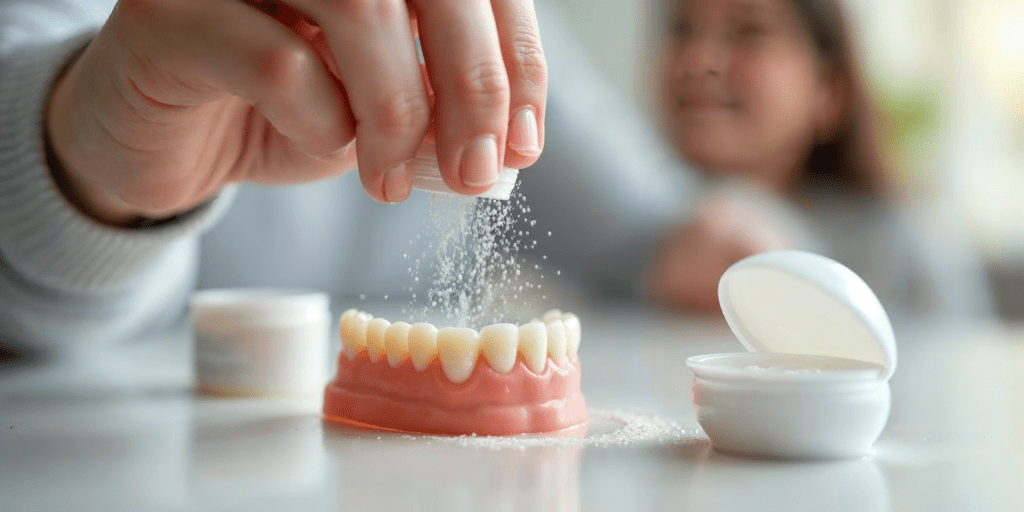
2. Adhesive Pads and Strips: Clean and Simple
Adhesive pads and strips are pre-cut and pre-shaped, making them easy to apply without the mess. You simply peel, place them on the denture, and press to fit. These pads provide even distribution, helping your dentures stay in place longer.
Pros:
- No mess, easy to apply.
- Great for partials or lower dentures.
Cons:
- May not offer as strong a hold as creams or pastes for upper dentures.
- Limited to certain denture shapes.
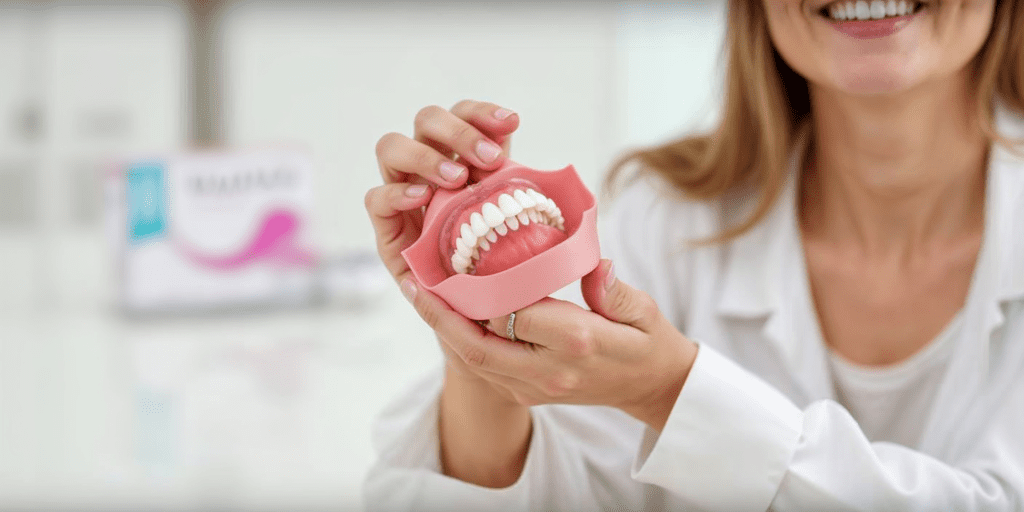
3. Cushioning Liners: Soft and Comfortable
Cushioning liners, such as those from products like Cushion Grip, fill the space between your gums and your dentures, making them fit more snugly. These liners create a soft, pliable surface that helps keep the dentures in place.
Who Should Use Cushioning Liners?
These are perfect if your dentures are loose due to gum shrinkage or if you have sensitive gums that get irritated easily.
Pros:
- Comfortable for long-term wear.
- Helps fill in gaps caused by bone loss or shrinking gums.
Cons:
- They’re temporary and need replacing every few weeks.

4. Temporary Relines: A Step Up from Glue
For a longer-term solution that still avoids adhesives, you can try temporary relines. These are thermoplastic materials that soften when heated, allowing you to mold the liner to your gums for a custom fit. Products like Cushion Grip can last up to four days.
How Temporary Relines Work:
- Soften the material by heating it.
- Apply it to the denture’s underside.
- Fit the denture into place for a snug, molded fit.
Pros:
- Can last for several days without reapplication.
- Provides a tighter, more secure fit.
Cons:
- Still a temporary solution, although more durable than glue or pads.
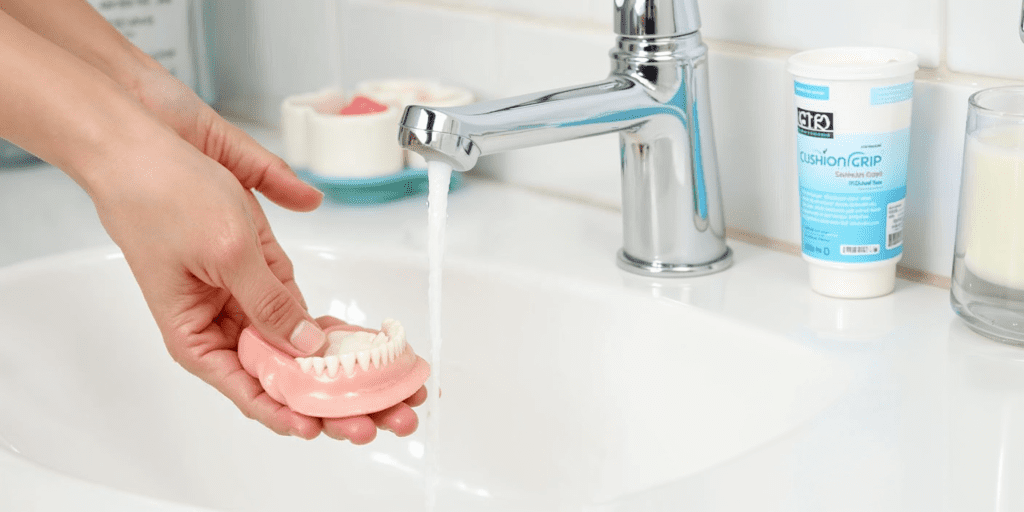
5. Muscle Training and Suction Techniques: Go Adhesive-Free
Did you know your facial muscles and tongue can help keep your dentures in place? Training yourself to use the right muscles and positioning can provide a natural, glue-free hold, especially for lower dentures.
How to Train Your Muscles:
- Keep your tongue positioned against the inside of the lower denture.
- Practice eating and speaking without relying on glue for security.
For upper dentures, natural suction (with the help of saliva) should hold them in place. If they’re slipping, it might be time for an adjustment.
Pros:
- No products or adhesives are required.
- Long-term solution with practice.
Cons:
- Takes time to master, especially for lower dentures.
- Doesn’t work if your dentures are ill-fitting.

6. Implant-Retained Dentures: The Permanent Solution
If you’re ready for a permanent fix, implant-retained dentures could be the way to go. Dental implants are titanium screws placed in your jawbone to hold your dentures in place securely. You’ll never need denture glue again.
Benefits of Implant-Retained Dentures:
- No adhesives or liners are required.
- They stay in place, making them feel more like natural teeth.
- They help prevent bone loss in the jaw, which happens over time with traditional dentures.
Pros:
- Permanent, reliable solution.
- No daily maintenance like with adhesives or relines.
Cons:
- Requires surgery and can be expensive.
- Not everyone is a candidate for implants due to bone density or health conditions.

What About DIY Denture Adhesive?
You’ve probably heard of people trying DIY denture glue recipes with ingredients like karaya gum or peppermint oil. While this might seem like a natural alternative, it’s risky. Homemade solutions can irritate your gums or fail to provide the stability you need. It’s best to avoid these DIY methods and talk to your dentist about safer, more reliable options.
Keeping Your Dentures Fit Without Adhesives
Adhesives can cover up bigger problems. If your dentures fit well, you shouldn’t need glue. Here’s how you can keep them snug:
- Visit your dentist regularly for adjustments: Over time, your gums shrink, and your dentures may no longer fit well. A reline can restore that snug fit.
- Clean your dentures daily: Brush them with a non-abrasive cleaner and rinse them after every meal. This helps maintain their fit and prevents gum irritation.
- Store dentures properly: Soak them overnight in a cleaning solution or water to keep them from drying out and warping.
Conclusion: Find What Works Best for You
If you’re tired of sticky messes and struggling with your dentures slipping, there’s no need to keep relying on denture glue. Whether you try powders, strips, temporary relines, or even go adhesive-free with muscle training, you have options. And implant-retained dentures offer a life-changing solution for those looking for a permanent fix.
Stop letting denture glue dictate your day. Explore these alternatives and find what works best for you—comfort, security, and confidence are just around the corner.
FAQs About What Can I Use Instead of Denture Glue
What’s the Best Glue for Dentures?
The best adhesive varies depending on your needs, but Cushion Grip and Secure are popular due to their strong hold and long-lasting effects.
Can I Use Regular Glue on Dentures?
Not! Household glues are toxic and can cause serious damage to your dentures and mouth.
How Can I Remove Denture Adhesive Easily?
Warm water or a soft toothbrush can help remove most adhesives. Adhesive removers specifically made for this purpose are also available.
